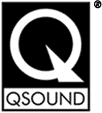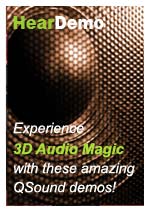Press Release
QSound Labs Signs Licensing Agreement With BroadCom; microQ Technology to Deliver Next-Generation Audio Capabilities to Handset Manufacturers
Continued Adoption of the microQ Product Suite Underscores its Position as the Definitive Audio Solution of Choice Among Mobile and Broadband Communications Leaders
Calgary, Alberta – June 2, 2004 -- QSound Labs, Inc. (NASDAQ: QSND), a
leading developer of audio, voice and e-commerce software solutions, today
announced its licensing agreement with Broadcom Corporation (NASDAQ: BRCM),
a leading provider of highly integrated semiconductor solutions enabling
broadband communications. Under the terms of the agreement, QSound is
providing its microQ synthesizer components for use in Broadcom’s base band
processors for mobile phones and PDAs, which includes rights to integrate
the technology across multiple platforms and chips.
QSound Labs’ microQ solution for Broadcom supports all of today’s most
popular content formats, namely, MIDI, SP-MIDI, Mobile DLS and SMAF. With
the integration of this technology into its mobile phone processors,
Broadcom will further reduce costs and space requirements for handset
manufacturing customers by eliminating their need to include an expensive
external ring tone chip.
Introduced in 2003, microQ tchnology is currently shipping in MiTAC’s
DigiWalker line of next generation smartphones and pocket PCs, including
the recently launched Mio 8390. MicroQ has been optimized for Intel’s®
Wireless MMX™ technology for mobile devices based on the newly launched
Intel® PXA27x processor family. Additionally, microQ has been ported to
several semiconductor platforms, including LSI Logic’s ZSP Processor family.
“Broadcom’s confidence in the microQ product suite is further indication of
its adoption as the definitive solution of choice among industry leaders,”
stated David Gallagher, President and CEO of QSound Labs. “QSound Labs is
committed to leading the mobile and broadband communication market in
next-generation audio capabilities.”
About microQ:
microQ is a compact, hardware-independent and highly efficient software
audio engine providing functions such as polyphonic ringtones, video game
sounds, music playback, digital effects and recording for portable
applications, including Internet appliances, hand-held and mobile devices. A
low-cost and flexible option for consumer electronics and mobile device
manufacturers, MicroQ is inherently modular, scalable and portable. Its core
components include a digital audio playback engine, a wavetable synthesis
engine with a scalable sample set, and a multi-channel stereo mixer.
Additionally, microQ offers a wide range of processes to control frequency
response, dynamics and spatial enhancements, as well as full 3D positional
audio.
About QSound Labs, Inc.:
Since its inception in 1988, QSound Labs, Inc. has established itself as one
of the world's leading audio technology companies. The company has developed
proprietary audio solutions that include virtual surround sound, positional
audio and stereo enhancement for the consumer electronics, PC/multimedia,
Internet and healthcare markets. QSound Labs’ cutting-edge audio
technologies create rich 3D audio environments allowing consumers to enjoy
stereo surround sound from two, four or 5.1 speaker systems. The company’s
customer and partner roster includes Toshiba, Philips, Sharp and
RealNetworks, among others. To hear 3D audio demos and learn more about
QSound, visit our web site at www.qsound.com.
This release contains
forward-looking statements within the meaning of the Private Securities
Litigation Act of 1995 concerning, among other things, use of microQ in
Broadcom processors. Investors are cautioned that such forward-looking
statements involve risk and uncertainties, which could cause actual results,
performance or achievements of QSound, or industry results to differ
materially from those reflected in the forward-looking statements. Such
risks and uncertainties include, but are not limited to, risks associated
with acceptance of microQ technology by manufacturers and consumers,
additional licensing arrangements, continued growth of the mobile
electronics market, dependence on intellectual property, rapid technological
change, competition, general economic and business conditions, and other
risks detailed from time to time in QSound's periodic reports filed with the
Securities and Exchange Commission. Forward-looking statements are based on
the current expectations, projections and opinions of QSound's management,
and QSound undertakes no obligation to publicly release the results of any
revisions to such forward-looking statements which may be made, for example
to reflect events or circumstances after the date hereof or to reflect the
occurrence of unanticipated events.

